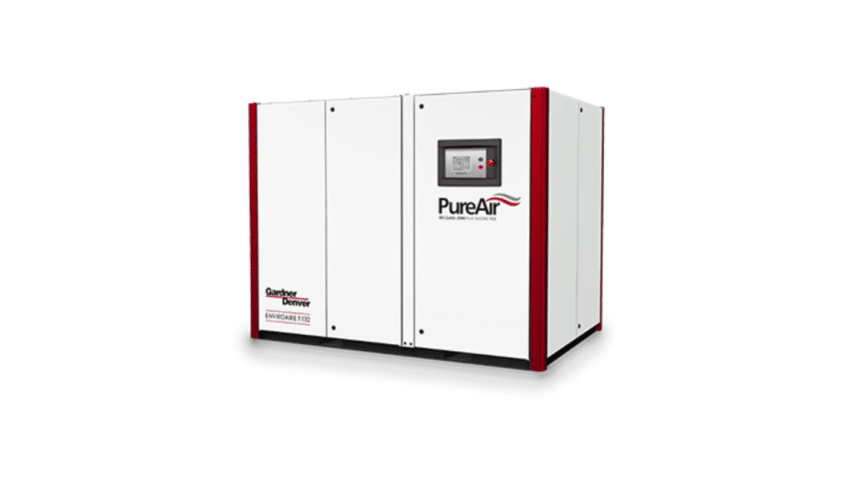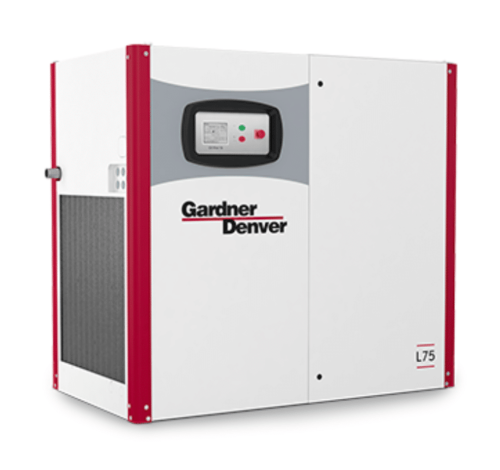
A Complete Guide to Industrial Air Compressors
An industrial air compressor is a device that utilizes either an electric motor or a diesel or gasoline-powered engine to convert power to potential energy stored in pressurized air. While they are similar in functionality to industrial pumps, compressors specialize in air and gas pressurization, while pumps specialize in liquids like water and oil.
Industrial air compressors are designed for use in a number of applications including spraying crops and ventilating silos in agricultural facilities, running pneumatic machinery in manufacturing operations, and operating laundry pressers in dry cleaners. They are also useful for other operations in the food and beverage and oil and gas industries.
Types of Industrial Air Compressors
There are three major varieties of industrial air compressors, which are commercial-grade reciprocating compressors, rotary screw air compressors, and oil-free scroll air compressors.
Commercial-Grade Reciprocating Compressors
Commercial-grade reciprocating compressors are the most common variety of air compressors found in small to medium-sized businesses. They are powered by a reciprocating piston that pushes air into the compression chamber. The most noticeable downsides to these air compressors are that they are loud and not very efficient.
They contain lots of moving parts that constantly grind against each other, creating lots of noise, friction, and heat. However, the cost of ownership of a reciprocating compressor is much lower, which is why smaller businesses like to utilize them.
Rotary Screw Air Compressors

Rotary screw compressors are much more powerful than reciprocating compressors and are also much quieter to boot. For more heavy-duty applications that require a constant concentration of pressurized air, rotary screw compressors are certainly the way to go. These high-quality energy-saving compressors are perfect for precision tasks like powdercoating and sandblasting.
Scroll Oil-Free Air Compressors
This variety of air compressor is quiet, efficient, and, as the name implies, oil-free. They are the perfect choice for operations in a laboratory environment, the manufacturing of pharmaceuticals, or any other process that requires clean, oil-free air. These efficient air compressors are nice because they hardly require any maintenance due to their lack of a need for oil.
Industrial Air Compressor Maintenance and Inspection
Proper maintenance and routine inspections of your industrial air compressor system can help to prevent costly downtime and emergency repairs. These preventative maintenance tasks may be performed by in-house technicians or by an industrial compressor maintenance and repair company like C&B Equipment.
The operator’s manual for your industrial air compressor should always be your first point of reference for service recommendations and maintenance intervals. The following are general industrial air compressor maintenance tips that are based on the typical intervals we see for these services. It’s possible that not all will apply to your air compressor type, and your service intervals may be more or less frequent.
- Air Filter The air filter should be changed every 1,000 hours or as needed. It is important to check it on a weekly basis, cleaning and removing any dust or debris.
- Oil Filter The oil filter should be changed every 1,000 hours or as needed.
- Lubricant The lubricant levels should be checked daily. Lubricant should be changed every 4,000 to 8,000 hours (depending on the type) or as required.
- Separator Element The separator element should be replaced at the same as the lubricant is changed.
- Motor Bearings The motor bearings should be greased every 2,000 hours or as needed.
- Belts The belts should be checked on a weekly basis for excess wear and tension. You can adjust the tension and replace belts as needed.
- Intake Vents The intake vents should be checked weekly and cleaned as needed.
Regular inspections will help spot potential problems and keep your industrial air compressor running effectively and efficiently. The following is a typical inspection checklist.
- Check to make sure the unit is clean and free of excess dust and debris
- Check the temperature of the system
- Check the pressure of the system
- Check the voltage of the system
- Check the amperage of the system
- Check the oil levels of the system
- Check to see if the system is vibrating
- Check the condition of the belts and make sure there is no excess tension
- Check the moisture drains for proper operation
- Check the coolers for dirt accumulation and clean them if needed
- Check to make sure all the controller settings are where they need to be
- Check for proper loading, unloading and modulation
- Check for any oil or air leaks
If you consider yourself to be a proficient DIYer, then you can certainly make these inspections and perform possible repair all by yourself. However, if you want to make sure that everything is done properly, leaving you with an energy efficient industrial air compressor, then take it in to a professional to get it looked at. At C&B Equipment, we specialize in air compressor repairs and maintenance and will help you keep operating costs as low as possible.
The Importance of Compressed Air Audits
Along with preventative maintenance, a compressed air audit performed by a professional can help you lower your energy costs, reduce downtime, lessen equipment wear, and keep your system running at peak efficiency.
When performing an audit, a technician taps into the main air lines and measures cubic feet per minute (CFM), pressure, and amp load over the course of several days. Measuring the compressed air usage helps save the supply of air at point of use and helps identify leaks in the system. Annual or bi-annual audits can help you keep on top of costly leaks and prioritize repairs.
The goal of an audit is to identify deficiencies in your industrial air compressor and, if possible, use existing equipment to reduce energy costs and improve air quality. This may include properly setting the controls, reducing leakage at auto drains, properly sequencing multiple units, and reducing artificial air demand.
Work with C&B Equipment!
C&B Equipment offers compressed air system audits and preventative maintenance and repair for both industrial air compressors and industrial pumping systems in Kansas and the surrounding areas. Take a look at all of the different services we provide, as well as the state-of-the-art compressor products that we distribute!
